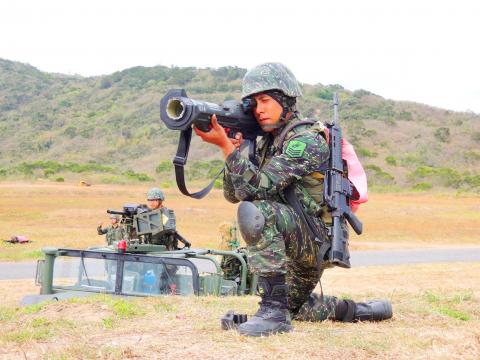Taiwan and the US have sealed a NT$3.8 billion (US$130.5 million) deal for 460 TOW-2B Aero radio frequency (RF)-controlled anti-tank missiles, which are to be delivered to Taiwan annually starting this year, with the final batch to be received by June 2024, a Ministry of National Defense source said yesterday.
The TOW-2B missiles are superior to the TOW-2A missiles the military currently uses in that they are wirelessly controlled rather than wire-guided, the source said.
The RF capability allows the missiles to more easily damage or paralyze enemy tanks by attacking them at more vulnerable points, the source said.

Photo: Lo Tien-bin, Taipei Times
After delivery of the missiles, the army’s anti-tank companies — on both Taiwan proper and its outlying islands — would have priority in deploying the missiles, the source said.
The TOW-2B’s maximum range of 4.5km allows it to be used not only in ground battles, but also to prevent enemy landings by engaging hovercraft and amphibious landing vehicles, the source said.
The sale is part of an arms package announced by the US in December 2015, originally for 769 TOW-2B RF missiles along with training equipment and support systems for a total of US$268 million, the source said.
After assessing the military’s equipment, the ministry elected to purchase 460 missiles due to a healthy number of TOW-2A missiles still in use, the source said.
The move was also a means to incentivize the Chungshan Institute of Science and Technology (CSIST) to make breakthroughs in research and development and produce anti-tank weaponry on a par with the TOW-2B, the source said.
The deal was officially signed by the Taiwanese defense attache and the American Institute in Taiwan, and was promulgated by the ministry on Thursday.
The CSIST is building missiles based on the Kestrel anti-armor rocket and has achieved multiple breakthroughs on key technologies, adding it is possible that the final product could produce an anti-tank missile at the level of the portable F6M-1HB Javelin or the TOW-2B.
The CSIST has also developed a Kestrel variant that can reach targets more than 1,200m away, a drastic improvement over the current Kestrel, which only has a range of 400m, the source said.
The CSIST’s Kestrel variant would be able to penetrate up to 400mm of rolled homogenous armor, which is an improvement on the original Kestrel’s penetration rate of 300mm, the source added.

CLASH OF WORDS: While China’s foreign minister insisted the US play a constructive role with China, Rubio stressed Washington’s commitment to its allies in the region The Ministry of Foreign Affairs (MOFA) yesterday affirmed and welcomed US Secretary of State Marco Rubio statements expressing the US’ “serious concern over China’s coercive actions against Taiwan” and aggressive behavior in the South China Sea, in a telephone call with his Chinese counterpart. The ministry in a news release yesterday also said that the Chinese Ministry of Foreign Affairs had stated many fallacies about Taiwan in the call. “We solemnly emphasize again that our country and the People’s Republic of China are not subordinate to each other, and it has been an objective fact for a long time, as well as

‘CHARM OFFENSIVE’: Beijing has been sending senior Chinese officials to Okinawa as part of efforts to influence public opinion against the US, the ‘Telegraph’ reported Beijing is believed to be sowing divisions in Japan’s Okinawa Prefecture to better facilitate an invasion of Taiwan, British newspaper the Telegraph reported on Saturday. Less than 750km from Taiwan, Okinawa hosts nearly 30,000 US troops who would likely “play a pivotal role should Beijing order the invasion of Taiwan,” it wrote. To prevent US intervention in an invasion, China is carrying out a “silent invasion” of Okinawa by stoking the flames of discontent among locals toward the US presence in the prefecture, it said. Beijing is also allegedly funding separatists in the region, including Chosuke Yara, the head of the Ryukyu Independence

‘VERY SHALLOW’: The center of Saturday’s quake in Tainan’s Dongshan District hit at a depth of 7.7km, while yesterday’s in Nansai was at a depth of 8.1km, the CWA said Two magnitude 5.7 earthquakes that struck on Saturday night and yesterday morning were aftershocks triggered by a magnitude 6.4 quake on Tuesday last week, a seismologist said, adding that the epicenters of the aftershocks are moving westward. Saturday and yesterday’s earthquakes occurred as people were preparing for the Lunar New Year holiday this week. As of 10am yesterday, the Central Weather Administration (CWA) recorded 110 aftershocks from last week’s main earthquake, including six magnitude 5 to 6 quakes and 32 magnitude 4 to 5 tremors. Seventy-one of the earthquakes were smaller than magnitude 4. Thirty-one of the aftershocks were felt nationwide, while 79

GOLDEN OPPORTUNITY: Taiwan must capitalize on the shock waves DeepSeek has sent through US markets to show it is a tech partner of Washington, a researcher said China’s reported breakthrough in artificial intelligence (AI) would prompt the US to seek a stronger alliance with Taiwan and Japan to secure its technological superiority, a Taiwanese researcher said yesterday. The launch of low-cost AI model DeepSeek (深度求索) on Monday sent US tech stocks tumbling, with chipmaker Nvidia Corp losing 16 percent of its value and the NASDAQ falling 612.46 points, or 3.07 percent, to close at 19,341.84 points. On the same day, the Philadelphia Stock Exchange Semiconductor Sector index dropped 488.7 points, or 9.15 percent, to close at 4,853.24 points. The launch of the Chinese chatbot proves that a competitor can